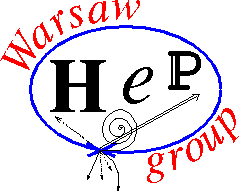SEMINARIUM FIZYKI WIELKICH ENERGII
Dnia 17 stycznia (piątek) o godzinie 11:30, w sali B2.38 odbędzie się seminarium, na którym zostanie wygłoszony referat pt.:
„Linear Collider Vision for the update of the European Particle Physics Strategy”
Referuje: prof. dr hab. Aleksander Filip Żarnecki (IFD UW)
LCVision idea was born in spring 2024. The main goal was to make a strong case for Linear Colliders in general, based on physics arguments. With mature designs for the first stage and attractive upgrade options Linear Collider Facility (LCF) is being proposed as an alternative option for the future project at CERN. Last week Linear Collider Vision Community Event took place at CERN with about 250 registered participants. Selected results from the meeting will be presented.
Serdecznie zapraszamy
dr hab. Katarzyna Grzelak
prof. dr hab. Aleksander Filip Żarnecki

